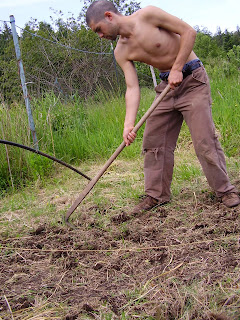In Etsuko's book (see previous entry), she suggests digging trenches around garden beds (generally 90~120cm for most veggies) and using that soil to make raised beds for better drainage. This of course depends on the climate, water, and soil situation specific to your site (this is true for all the suggestions from her book and other gardening methods). The beds should be arranged north to south rather than east to west to allow for equal sun distribution on the plants. In heavy clay sites where water may not drain fast enough, you might want to design in a way to release water from the ditch/paths.
First, cut the weeds at soil level with a kama (Japanese hand sickle), or you can go the all-American route and use a weed-whacker. I used a kama because it made more sense to me and that is what Kawaguchi uses. Then lightly shave the top of the soil to remove the weed seed bank and running weeds. I spent a lot of time thinking about what "no weeding" in shizeno and how this act of shaving fits in. But, like Kawaguchi said, the goal of natural farming is not just to be "natural" but to cultivate food too. I also have a desire to "succeed" in this experiment for various reasons, and have some harvest. Anyways, to each his/her own, and I decided to follow her advice as I know it will make things easier for me later in the season.
 I used a kuwa and shaved off the top of the future garden beds.
I used a kuwa and shaved off the top of the future garden beds.Then I trenched around the the perimeter. The trench was a way to raise the beds as this area is sandy loam soil near a pond, so it gets quite wet. It also acts as a barrier to keep quack grass (a vigorous running weed) from overwhelming the garden beds.
 I also delineated the garden beds with (bamboo) sticks and string, which is something I learned from a professor of agroecology, Steve Gleissman, who taught a Biointensive gardening internship at UCSC. Etsuko also suggested doing this. I find it aesthetically pleasing and it probably legitimates "strange" or "hippie" gardening to the mainstream audience.
I also delineated the garden beds with (bamboo) sticks and string, which is something I learned from a professor of agroecology, Steve Gleissman, who taught a Biointensive gardening internship at UCSC. Etsuko also suggested doing this. I find it aesthetically pleasing and it probably legitimates "strange" or "hippie" gardening to the mainstream audience.More stuff to come....
No comments:
Post a Comment